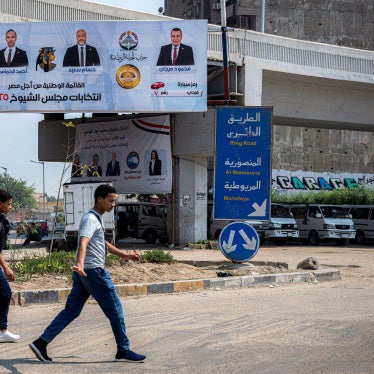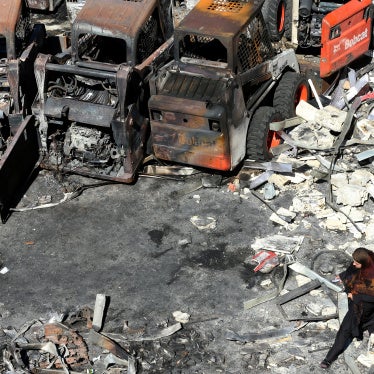There is not much to celebrate this Human Rights Day. Grave abuses are committed daily in Syria, Iraq, and Libya. Refugees from Syria and Iraq are going hungry as neighboring countries gradually close their borders and international support dwindles. Egypt’s judiciary – once an institution that prided itself on its independence — is issuing death sentences by the hundreds without any semblance of due process. Sectarian hatred fills the airwaves while bloggers who criticize their rulers are thrown in jail. Meanwhile, women are treated as second-class citizens in almost all countries in the Arab world.
Human rights are under attack. Not just by extremist groups like the Islamic State (ISIS) that explicitly reject international human rights norms. But also by autocratic governments that want to silence any dissent or social demands that may challenge or weaken their rule. To achieve these objectives, these governments are no longer just relying on their loyal and feared security services, but are increasingly unleashing media outlets to drum up popular support for their repression under the guise of fighting terror or foreign conspiracies. These attacks are taking their toll on human rights defenders.
Try defending the right of Muslim Brotherhood members in Egypt or the rights of atheists or gays in Saudi Arabia or Iran. Not only will officials accuse you of conspiring against your country, but many media outlets will join in attacking you and sometimes your family. Just ask the numerous Egyptian activists who had to leave their country in the past year under incessant intimidation and fearing arrest. Even traditional bastions of free expression in the region like Kuwait and Lebanon have grown more intolerant of certain subjects such as criticism of the Emir in Kuwait or, to a lesser extent, the army in Lebanon.
Human rights work was never about taking on popular causes. Human rights are essential because they are meant to act as a check on abuses against the vulnerable including those who the general public in any given country dislikes. This means defending the rights of groups often considered “outsiders” like refugees or migrants, but also individuals who are often publicly portrayed as “undeserving” of human rights protections, such as terrorism suspects. In other words, to believe in human rights is to believe in a principle regardless of the victim or the personal sympathy one may have for the victim of rights abuse: the prohibition on torture and the right to a fair trial do not cease applying when the victim is a suspected terrorist, a Qaddafi, a Saddam, or possibly one day an Assad, even if they denied those rights to others.
Many activists in the region have refused to compromise on their principles and have consequently paid a heavy price, sometimes with their lives or freedom. People like Alaa Abdel Fatah in Egypt, or Nabeel Rajab in Bahrain, who continue to protest and oppose unfair laws and practices in their countries despite multiple stints in prison. Courageous lawyers like Razan Zeitouneh, who worked for years documenting Syrian government abuses and suffered persecution as a result, until rebel groups abducted her on December 9, 2013, probably because of her human rights work in areas under their control.
It is the commitment of these activists that gives meaning to this year’s Human Rights Day slogan, Human Rights 365, which is meant to highlight that human rights are for everyone all the time. That message is best captured by activists like Alaa, Nabeel, or Razan, who show us day after day what true commitment to human rights means. The least we can do on this Human Rights Day is recognize and honor their work and renew our efforts to have their rights respected. It is the least we can do since they work 365 days a year for the rights of others.
Nadim Houry is deputy Middle East and North Africa director at Human Rights Watch and head of its Beirut office. Follow on Twitter @nadimhoury








